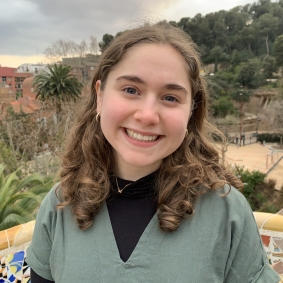Knauss legislative fellowships in Congress help build careers — and they're fun and educational. See our video and fact sheet for details.
Caldonia Carmello

Fellowship Institution:
Start Year
2024Caldonia (Cally) graduated from the University of Delaware in 2023 with an Honors B.S. in Environmental Science and a minor in Marine Science. While there, she conducted research on a wide variety of topics related to climate change, coastal science, and plant ecology. She fell in love with wetlands specifically while studying saltmarsh grasses in the Delaware Great Marsh Preserve. Sharing her passion for coastal ecology and conservation through various campus leadership positions inspired her to continue pursuing opportunities in environmental outreach.
Since graduating, Cally has worked in positions across the country learning about conservation, land management, and science communication. A common thread throughout her academic and professional career has been her passion to apply scientific research and foster human connection. Her passion for the Chesapeake Bay region has brought her to Maryland Sea Grant where she is continuing to hone her skills as Science Management and Policy Intern. A few workshops and webinars Cally has contributed to so far include topics such as drone usage for coastal management, connecting coordinators across the Chesapeake Bay, and fostering collaborations between artists and scientists.
Call for Symposium Presenters and Authors
The Chesapeake Rising: Innovative Law and Policy Solutions for Climate Adaptation in Coastal Communities symposium will explore key legal and policy considerations that affect climate adaptation strategies. It provides a unique opportunity for upper-level law students and early-career lawyers to present and publish their legal scholarship.
Program Announcements
-
-
Maryland Sea Grant has program development funds for start-up efforts, graduate student research, or strategic support for emerging areas of research. Apply here.
News and Blogs
Video Gallery
Sea Grant Film Explores a Diminishing Smithville
Smithville is a community on Maryland’s Eastern Shore, on the edge of the Blackwater National Wildlife Refuge. A century ago, Smithville had more than 100 residents. Today, it has four, in two homes: an elderly couple, and one elderly woman and her son, who cares for her.
Featured Fellow
Featured Research Project
Developing a habitat model for mysids, an important link in Chesapeake Bay food webs
Mysids are important mesozooplankton prey for many species of fish in Chesapeake Bay and are an important link in transferring energy from lower to upper trophic levels. Mysids also serve as biological vectors for benthic-pelagic coupling due to their diel vertical migration and omnivorous prey-switching behavior, which makes mysids important regulators of food web architecture. Despite their central role in coastal food webs, surprisingly little is known about mysid ecology and dynamics in Chesapeake Bay.
The Blue Crab: Callinectes Sapidus
An essential resource for researchers, students, and managers. Get your copy today!


©2025 Maryland Sea Grant. All rights reserved.
5825 University Research Court, Suite 1350 | College Park, MD 20740
Phone: (301) 405-7500 | Fax: (301) 314-5780 | Contact Us



